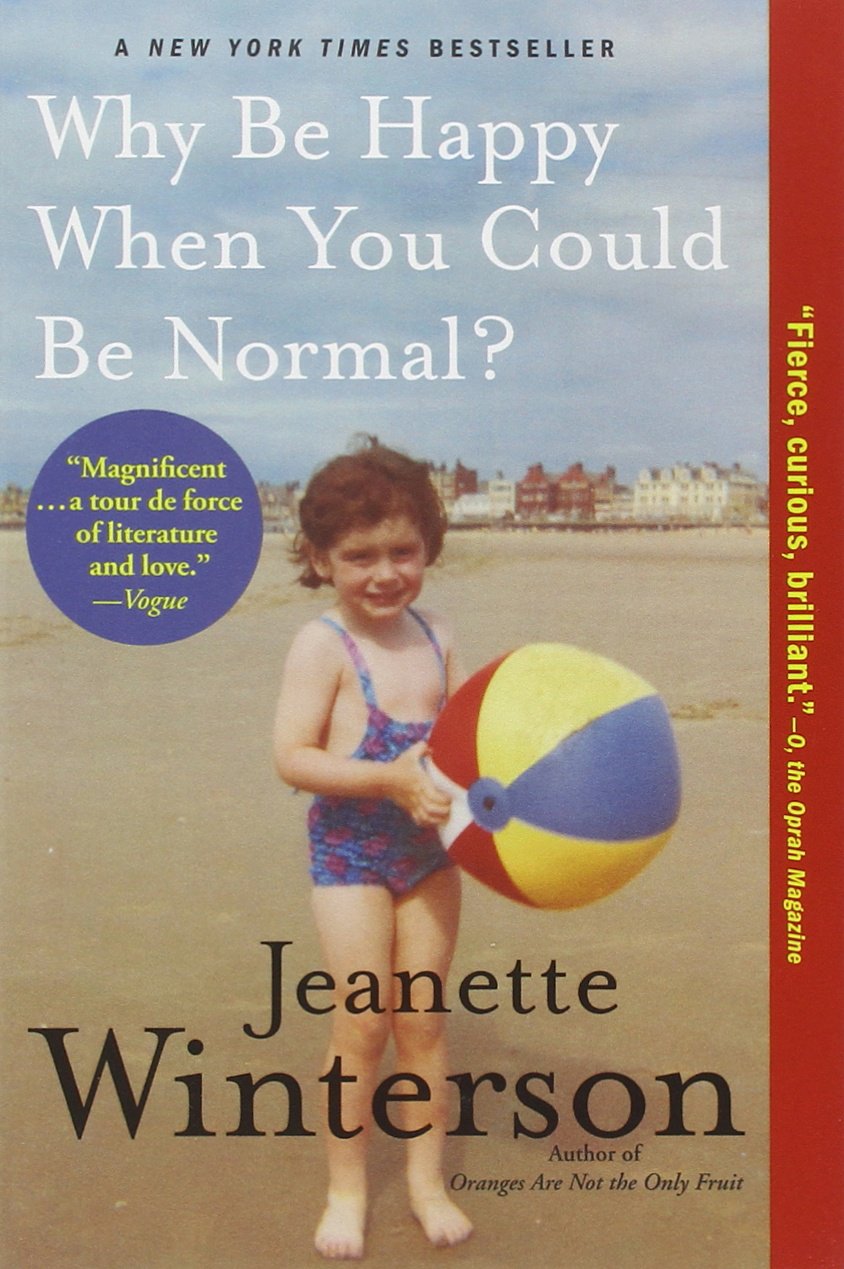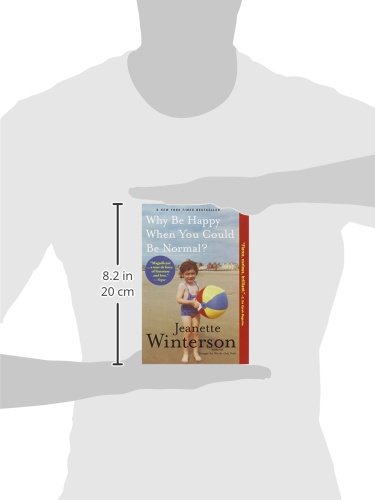



Why Be Happy When You Could Be Normal?
M**E
Best Adoption Memoir in recent years
I love this book! Ms. Winterson is a beautiful and skilled British writer, so rare in adoption memoirs, and her life is a harrowing tale of a soul battered but not broken by a deeply abusive childhood and difficult life. The title comes from something her adoptive mother, whom she always refers to as "Mrs. Winterson,", said to teenaged Jeanette when she said being a lesbian and loving women made her happy. Mrs. Winterson replied, "why be happy when you can be normal"? That sums up one of the worst adoptive moms ever very well. The irony is that Mrs. Winterson was far from "normal" herself.Jeanette's generosity of spirit comes through in her embrace of the better parts of a severely Fundamentalist religious upbringing by a mentally ill adoptive mother and passive father, and her attempts at understanding and forgiveness of things that seem unforgivable. The ghosts of this past almost destroy her, but she emerges a survivor who loves and embraces life and refuses to settle for life without passion. She is a woman capable of introspection, growth, and wit, even in the political realm, as shown in her initial embrace of Margaret Thatcher and later rejection of her policies. This is a book about so much more than adoption, but the deep inner pain of being an adoptee who was never accepted for herself in a poor and dysfunctional family is always at the core.This may sound grim, but it is not the story of a whining victim nor of a person who blames everyone else for her ills. That Jeanette got out of that life at 16 and got a degree from Oxford University by sheer force of will and desire is a tribute to her inner strength, despite dealing with adoption issues and her sexuality which was soundly condemned by her church and parents. Her story is told with as much humour as pathos, and shows her plucky and hopeful attitude even in the worst of times.Yes, she searched, reunited with her birth mother, was fully accepted, but that was not the happy ending either; in fact, the book does not end but leaves the future open, as it is. Like many adoptees, Jeanette does not feel fully at home in either family, despite the warm welcome from her birth mother and other kin. But she has reached a place of enough self-awareness to make her own home with her partner and her books and her vivid and life-saving imagination. She has endured and prevailed despite crushing obstacles.I identified with her love of literature and poetry, and how books opened the world to her as a lonely child who was not allowed any safe place of her own. I admired her skill and grace in telling her story, and in explaining how no story is literally true but an attempt to make sense and order of the chaos that is life. We need more books with this level of insight and complexity to do justice to the adoptee story.This is the best adoption memoir I have read since B.J. Lifton's work, and I recommend it to all.
F**K
An Inspirational and Real Book
Jeanette Winterson has such a command of mixing complex intellectual and spiritual ideas with concrete and real language and situations. For me, personally, this book helped a lot. The way Ms. Winterson discusses her mental health towards the end of the book was really interesting and inspiring. She has some great words about overcoming adversity and how creativity is linked with the search for health.One thing I thought the booked lacked was a description of her writing books like Sexing the Cherry and Gut Symmetries. She mostly writes about her years growing up, her early college years, and then her recent life with her birth family.She writes here with her trademark style. She uses her approach to non-linear time as she talks about her life and coming of age. This book really gives a glimpse at how and why Ms. Winterson is the way she is, and writes the way she does.I think her life and views are extremely inspirational. She discusses Christianity, general spirituality, writing, literature, and life with clear honesty. She doesn't write with an all or nothing mentality, either. She acknowledges both the positives, negatives, and different shades of her experiences in a very open way.On the whole, I felt like this book really helped encourage me personally and spiritually. And it was extremely inspiring to hear how she can be so smart, yet so humble and non judgmental, and still very real.
L**B
A deeply passionate, personal memoir.
"Books, for me, are a home. Books don't make a home-they are one, in the sense that just as you do with a door, you open a book, and you go inside. Inside there is a different kind of time and a different kind of space. There is warmth there too - a hearth. I sit down with a book and I am warm. I know that from the chilly nights on the doorstep." pg. 61Jeanette Winterson grew up in an unhappy, abusive, and religious Pentecostal family. She was adopted at a young age and her mother planned to mold her into a missionary of God. Yet Jeanette heard time and time again that her parents were led to the wrong crib. Jeanette grew up with the knowledge that she never really belonged. She didn't belong to her adoptive parents, she didn't belong to her birth parents, she didn't belong to her public school because she was so religious and she didn't belong to her church because she was a lesbian. She spent many nights outside, alone on her doorstep.She was kicked out of her home at the age of 16 and was homeless living in her car. Growing up, books were forbidden in her house and so the library became a haven and she began to read every author from A to Z in English Literature. She applied to Oxford and to her surprise got in as the "working class" experiment. Jeanette then writes her first book, Oranges are Not the Only Fruit, when she was 24. Some words of advice: Read Oranges are Not the Only Fruit before you read this book. It will make a big difference.I once heard that if you don't deal with the trauma of your past, that the trauma will find you and make you deal with it. Well that is what happened to Jeanette. She sunk into a type of madness, became depressed and emerged forever changed. When Jeanette decides to go on with her life she then makes the decision to find her birth mother.Why Be Happy When You Could Be Normal is an amazing memoir. It is not told in a linear fashion but it is full of life and passion. Complex, yet simply told, Winterson bares her soul, telling her readers that she never learned how to love nor how to be loved. Why Be Happy When You Could Be Normal is an explanation of her book, Oranges and a confession of a very painful past. She divulges her tumultuous past with style, wit and grace all the while showing her readers, wisdom and the strength to endure. I was so inspired and riveted to Jeanette's story and have many passages of wisdom marked in my book. This memoir is deeply personal to Winterson and to me, as the reader. I felt I was looking into the window of her soul."Nobody can feel too much, though many of us work very hard at feeling too little.Feeling is frightening.Well, I find it so."Pg. 187
K**N
Five Stars
Fantastic read
T**E
Livro pra vida toda
Jeanette já está entre minhas escritoras favoritas. O livro é ótimo, daqueles que ficam com você. Uma história de vida incrível. pretendo ler novamente no futuro. Vale a pena comprar.
A**B
Uni
have read a couple of pages and am enjoying it there is load of info which will be great for the 4000 essay i am doing
A**ー
ジャネット・ウィンターソンによる歌付き!
インターネットのレビューを見ていたら、オーディオブックもあるということで興味がありましたが、なんと1400円位!。しかも作者による朗読!TOEICのヒアリング教材にしようというのも兼ねて購入しましたが。現地(私が買ったのはオーストリア?)からの送付だったので、もともとの配達予定期間内ではありますが3週間位かかりました。CDは5枚で7時間位です。へぼへぼTOEICしている位なので本の方も理解度は50%位だと思いますが、音声では勝手にわからない部分を省略した脳内処理をするのか、わかるところだけわかった感があります。日本にも村上春樹による自作の朗読CDとかあればいいのに。
R**A
Interesting reading
While I found this book interesting it was sometimes a bit over the top on detail. However she is a highly regarded writer and author and so I stuck with it.
Trustpilot
3 weeks ago
1 month ago